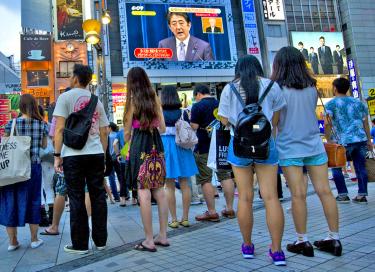Japanese Prime Minister Shinzo Abe yesterday expressed “utmost grief” for the suffering Japan inflicted in World War II and vowed that Japan would never again use force to settle international disputes, but he said that future generations of Japanese should not have to keep apologizing for the mistakes of the past.
Abe, marking the 70th anniversary of the end of the war, also said he upheld past official apologies, including a landmark 1995 statement by then-prime minister Tomiichi Murayama, but the conservative leader offered no new apology of his own.
The legacy of the war still haunts relations with China and South Korea, which suffered under Japan’s sometimes brutal occupation and colonial rule before Tokyo’s defeat in 1945.
Beijing and Seoul had made clear they wanted Abe to stick to the 1995 “heartfelt apology” for suffering caused by Tokyo’s “colonial rule and aggression.”
“Upon the innocent people did our country inflict immeasurable damage and suffering,” Abe said in a statement. “When I squarely contemplate this obvious fact, even now, I find myself speechless and my heart is rent with the utmost grief.”
“In Japan, the post-war generations now exceed 80 percent of its population. We must not let our children, grandchildren and even further generations to come, who have nothing to do with that war, be predestined to apologize,” Abe said.
“Still, even so, we Japanese, across generations, must squarely face the history of the past,” he said.
Abe, who referred to the wartime sufferings of the Chinese in his statement, said he hoped Beijing would recognize Japan’s “candid feelings” and that he hoped to meet Chinese President Xi Jinping (習近平) if the opportunity arose.
He later told a news conference that attempts to “change the ‘status quo’ by force” were unacceptable.
Abe said Japan should “never forget that there were women behind the battlefields whose honor and dignity were severely injured,” but he made no direct reference to “comfort women.”
Abe said that Japan took the “wrong course and advanced along the road to war,” but his statement did not specifically refer to what a report by his own advisers had called Tokyo’s “aggression” in China after 1931.
Abe told the news conference that the question of whether a specific act was “aggression” should be left to historians.
Source: Taipei Times - 2015/08/15





















